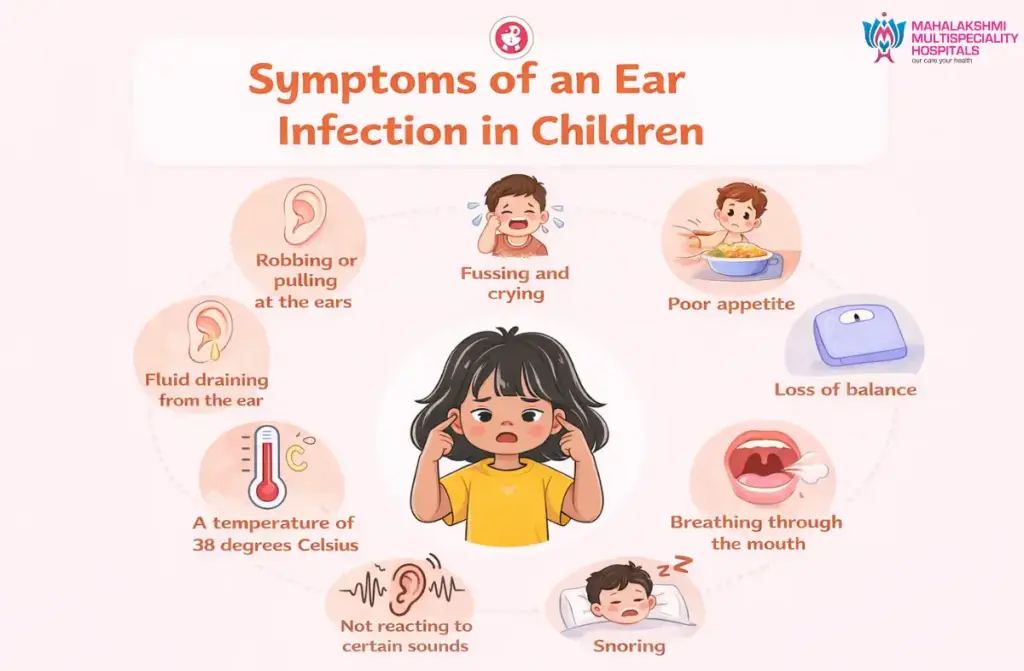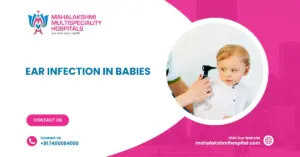An ear infection in babies happens when bacteria or viruses cause inflammation and fluid buildup behind the eardrum, usually in the middle ear. Because a baby’s ear passages (called Eustachian tubes) are smaller and more horizontal, fluid can become trapped more easily after a cold or congestion, leading to pain and pressure.Few things concern parents more than seeing their baby cry or act uncomfortable without a clear reason. One common cause of sudden fussiness, tugging at the ear, or restless nights can be an ear infection in babies.
In this post, we’ll explore the signs of ear infection in babies, ear infection in babies’ reason, treatment options, prevention tips, and when it’s time to contact your pediatrician — so you can feel calm, informed, and confident caring for your child.
Ear Infection Signs and Symptoms
Because infants can’t describe what they feel, noticing an ear infection in babies often means paying attention to subtle changes in their behavior.
Common signs of ear infection in baby include:
- Tugging or pulling at one or both ears
- Trouble sleeping or frequent night waking
- Crying more than usual, especially when lying down
- Fluid or discharge coming from the ear
- Difficulty responding to sounds or appearing less alert
- Fever, poor appetite, or general irritability
Remember, not every ear pull indicates an infection. But if several of these symptoms appear together, it’s a good idea to have your pediatrician check your baby’s ears. Early attention can ease discomfort and prevent complications.
What Causes an Ear Infection?
The causes of ear infection in babies often relate to how their tiny ear passages are still developing. The Eustachian tubes — small channels that connect the middle ear to the back of the throat — are shorter and more horizontal in infants. This makes it easier for fluid to become trapped, especially after a cold or congestion.
Common ear infection in babies reasons include:
- Colds, sinus infections, or allergies that block the Eustachian tubes
- Bacteria or viruses entering the middle ear
- Bottle-feeding while lying flat, which allows milk to enter the ear canal
- Exposure to secondhand smoke or polluted air
- Sudden weather or seasonal changes
Most of these causes of ear infection in babies are common and short-term. With proper treatment and care, most infections clear up quickly and leave no lasting effects.

Ear Infection Treatments
Treatment for ear infection in babies depends on the severity and whether the infection is bacterial or viral. Many mild infections resolve naturally within a few days as the body fights off the germs.
Your pediatrician may recommend:
- Warm compresses over the affected ear to ease pain
- Pain relievers (like infant acetaminophen or ibuprofen) to reduce fever or discomfort
- Antibiotics if the infection is bacterial or persistent
- Keeping your baby upright during feeds to promote proper ear drainage
Always follow your doctor’s advice and avoid using over-the-counter drops unless prescribed. Most babies start feeling better within a few days and recover completely within a week or two.
What are the Risk Factors for Ear Infections?
Certain factors make ear infection in babies more likely, but understanding them can help parents take preventive steps:
- Babies between 6 months and 2 years old (their ear structures are still maturing)
- Bottle-fed babies, especially when fed lying flat
- Daycare attendance, which increases exposure to colds and germs
- Secondhand smoke exposure
- Family history of frequent ear infections
- Seasonal allergies or recurring colds
Being aware of these factors allows you to reduce your child’s risk and protect their ear health through small daily changes.
Ear Infection Prevention
While it’s not always possible to prevent every ear infection in babies, there are several ways to lower the risk:
- Breastfeed when possible — breast milk helps build strong immunity
- Avoid feeding your baby while lying flat
- Keep your baby’s nose and throat clear during colds
- Wash hands frequently to reduce germ spread
- Keep your baby away from smoke or strong fumes
- Ensure your child receives recommended vaccines, which protect against infections that can lead to ear issues
Simple habits like these go a long way in keeping your baby’s ears — and overall health — in good condition.
Home Remedies for Ear Infections in Kids
Some home comforts can help your baby feel better while waiting for the infection to heal or before seeing the doctor. Many simple remedies address the ear infection in babies reason, such as fluid buildup or mild inflammation caused by colds. Gentle steps like using a warm compress, keeping your baby upright, and ensuring proper hydration can ease discomfort naturally.
- Apply a warm compress to the affected ear for 10–15 minutes
- Keep your baby well-hydrated to thin mucus and aid recovery
- Let your baby rest in an upright position during naps
- Offer gentle cuddles and comfort — calm and closeness help your baby relax
Always talk with your pediatrician before trying any home remedy, especially if your baby is under six months old or shows signs of severe pain or fever.
When Should I Take My Child to See a Doctor?
Seek medical advice if your baby:
- Has a fever above 100.4°F (38°C)
- Shows ear drainage or pus
- Cries persistently or seems in pain for more than 24 hours
- Has hearing problems or trouble balancing
- Experiences repeated ear infections in babies
Results
Most ear infections in babies are short-lived and heal completely with the right care. At Mahalakshmi Hospital, we believe that early attention, proper hygiene, and simple preventive steps can help your baby recover quickly and comfortably. Remember, you’re never alone in this journey. Our pediatric specialists are here to guide and support you every step of the way, ensuring your little one’s health and happiness are always in safe hands.
Read also: Best ENT Hospital in Tamilnadu






